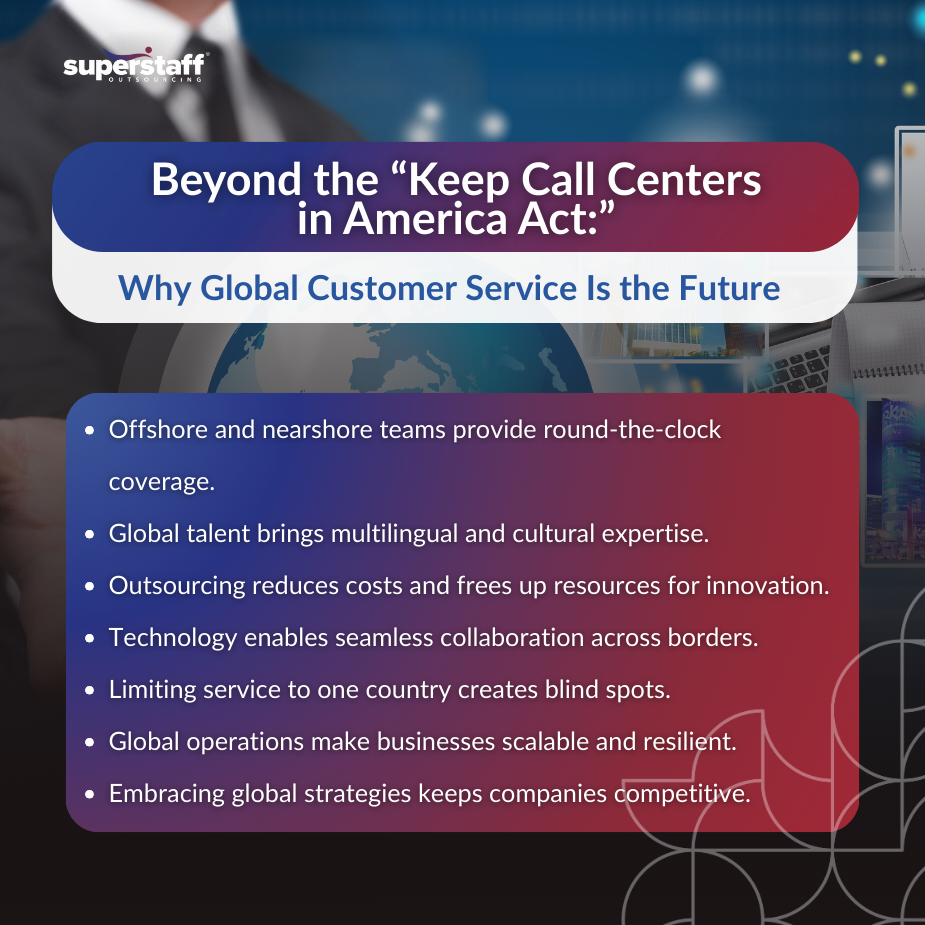
When conversations about outsourcing surface in the U.S., the Keep Call Centers in America Act often comes up as a rallying point for keeping jobs local. While the sentiment resonates on a national level, it tends to miss the bigger picture. Customer service today is no longer confined by geography; it’s a global arena where companies compete not just on price, but on quality, speed, and scalability.
The real conversation isn’t about restricting call centers to one country. It’s about how businesses can embrace worldwide talent and cutting-edge technology to build a customer service model that meets modern expectations.
Offshore call centers and nearshore strategies are not just cost-saving tactics; they are strategic moves that empower companies to scale quickly, deliver around-the-clock support, and provide personalized experiences across cultures and languages.
For organizations looking to stay competitive in a digital-first world, understanding the global nature of customer service isn’t optional; it’s essential. This blog explores what the Keep Call Centers in America Act means for businesses, and why the future of customer experience depends on embracing offshore and nearshore outsourcing.
The Bigger Picture: Understanding the ‘Keep Call Centers in America Act’
The Keep Call Centers in America Act is a legislative proposal designed to discourage companies from moving customer service operations overseas. At its core, the Act seeks to protect U.S. jobs by requiring businesses that relocate call centers abroad to disclose those moves and, in some cases, limit their eligibility for federal grants or loans.
While the goal is to preserve domestic employment, the Act overlooks how global customer service has evolved. In today’s marketplace, businesses must balance cost efficiency, scalability, and 24/7 availability: factors that often make offshore call centers and Philippine call center outsourcing essential to meeting customer expectations.
The Growing Globalization of Customer Service
Customer service has become a worldwide operation, not just a domestic function. In today’s interconnected economy, companies serve customers across multiple time zones, languages, and cultures.
The globalization of customer service reflects this shift, with organizations increasingly relying on outsourcing to meet growing demands. Offshore call centers in regions like Asia and Latin America provide access to specialized skills and multilingual capabilities that domestic teams alone often cannot supply.
Global talent pools meet rising expectations.
As consumer demands rise, businesses need representatives fluent not only in English but also in Spanish, Mandarin, and other languages. Offshore and nearshore partners bring this talent to the table, allowing brands to engage customers seamlessly in their preferred language.
Access to different time zones ensures true 24/7 support.
Customers no longer accept “business hours” as the standard for support. Global teams provide continuous service, ensuring customers receive help whenever they need it, day or night.
These trends highlight why limiting service to one geography is out of step with customer needs. Modern customer service requires flexibility and reach that only a global model can deliver.

Savings and Scalability: The Powerful Benefits of Offshore Outsourcing
Offshore outsourcing delivers scalability and efficiency. Outsourcing offshore has been a business strategy for decades, but today it plays an even greater role in helping companies thrive in uncertain markets. By partnering with providers abroad, businesses reduce overhead costs while gaining access to skilled agents trained to handle diverse customer needs.
Cost savings enable reinvestment in innovation.
Offshore outsourcing allows companies to cut labor and infrastructure expenses significantly. These savings can then be reinvested into digital transformation, new product development, and customer experience improvements—areas that directly fuel growth.
Access to highly trained agents in markets like the Philippines.
Philippine call center outsourcing has become a cornerstone of global customer service. The country’s strong English proficiency, cultural compatibility with Western markets, and decades of BPO experience make it one of the most reliable destinations for outsourcing.
Companies that choose the Philippines gain access to professionals who are not only skilled in communication but also trained in empathy, problem-solving, and technical support.
Beyond cost, companies also benefit from cultural adaptability and service quality. Offshore outsourcing doesn’t just lower expenses; it elevates the customer experience through skilled, globally minded teams.
The Proximity Edge: Advantages of Nearshore Outsourcing
Nearshore outsourcing blends convenience with capability. While offshore call centers bring scale and expertise, nearshore options offer proximity, speed, and alignment with U.S. operations. Businesses increasingly turn to nearshore partners in Latin America to complement their offshore strategies.
Nearshore teams in Colombia provide real-time collaboration.
Colombia has rapidly emerged as a nearshore hub for U.S. businesses. With its location just a few hours from major U.S. cities, companies benefit from overlapping workdays and real-time problem-solving. Teams can collaborate more naturally, eliminating the delays often associated with large time zone gaps.
Spanish-English bilingual talent supports U.S. markets seamlessly.
With the Hispanic population in the U.S. projected to exceed 111 million by 2060, Spanish-language customer service is no longer optional; it’s essential. Colombian teams deliver bilingual support that helps companies engage this critical market effectively.
Combined with offshore strategies, nearshoring offers businesses the flexibility they need. Together, these models create a balanced global workforce that maximizes cost efficiency and customer satisfaction.
Technology as a Global Equalizer
When discussing the “Keep Call Centers in America Act,” many argue that access to advanced technology is one of the advantages of keeping operations onshore. However, on the flip side, digital tools make global customer service seamless.
Technology has erased the boundaries that once separated domestic teams from their offshore and nearshore counterparts. Cloud-based platforms, AI-driven analytics, and omnichannel solutions empower businesses to manage global customer service operations with the same visibility and consistency as in-house teams.
Offshore and nearshore teams operate on the same systems as U.S. teams.
Unified platforms ensure that no matter where agents are located, they access the same tools, data, and knowledge bases. This creates a consistent customer experience across borders.
Businesses achieve consistency and real-time visibility.
Supervisors can monitor calls, track metrics, and manage quality assurance in real time, whether the agent is in Manila, Bogotá, or Dallas. This level of transparency removes the old barriers of outsourcing and reinforces trust in global operations.
With this infrastructure, global teams are positioned to future-proof customer service. Businesses that integrate technology with global outsourcing strategies are setting themselves up for sustainable success.
The Future of Global Customer Service
Customer expectations are evolving faster than ever. They demand instant responses, personalized experiences, and 24/7 availability. Limiting service to one country, no matter how well-intentioned, creates blind spots and higher costs for businesses.
Here’s the truth: The future belongs to businesses that embrace a global strategy. Today’s companies implement a blend of onshore, offshore, and nearshore strategies to stay competitive.
Customer expectations demand always-available support.
Whether it’s a customer in New York at 2 a.m. or in Los Angeles during a holiday, they expect immediate assistance. Only global outsourcing models provide the reach and redundancy to guarantee uninterrupted service.
Businesses need scalable, resilient global operations to stay competitive.
By leveraging nearshore and offshore call centers, companies can handle seasonal spikes, manage risks, and ensure continuity even during local disruptions. This flexibility is critical for businesses facing unpredictable markets and economic shifts.
This is where SuperStaff comes in. With operations in both the Philippines and Colombia, SuperStaff provides the best of both worlds—offshore scalability and nearshore convenience—helping businesses prepare for the future of global customer service.
Embrace the Future of Customer Service With a Hybrid Outsourcing Strategy
The Keep Call Centers in America Act raises important questions about the future of jobs, but it misses the bigger reality of where customer service is heading. The debate shouldn’t be about keeping call centers in one place, but about harnessing global strengths to deliver better customer service.
Globalization has reshaped how companies interact with customers. Offshore call centers bring efficiency and scale, Philippine call center outsourcing offers unparalleled expertise, and nearshore options in Colombia provide convenience and cultural alignment. Technology ties it all together, ensuring that businesses can deliver seamless, future-ready support across borders.
The companies that win in the future won’t be the ones that confine their operations. They’ll be the ones that embrace the world as their service desk.
Partner with SuperStaff to build a global customer service model that delivers quality, scalability, and future-ready support. Together, we’ll help you meet your customers wherever they are.






